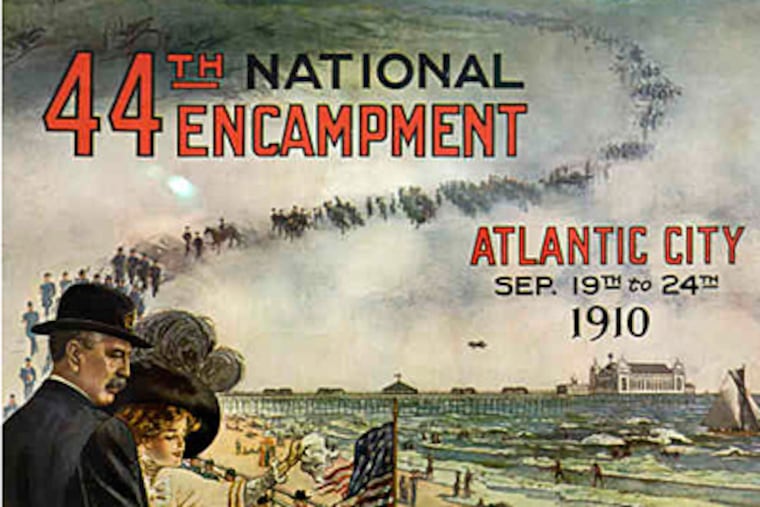
ATLANTIC CITY - The event 100 years ago was called a "glittering, glorious, and gratifying success." As many as 30,000 Civil War veterans and their families converged here for the 44th annual encampment of the Grand Army of the Republic.
Where the land ends and the sea begins, they constituted the largest gathering of the organization, which Civil War veterans from all over the United States formed to "keep green the memories" of the soldiers who fought in the deadliest war in American history. About 620,000 of their comrades had died.
But the memory of that glorious encampment has faded.
So the Atlantic City GAR Centennial Committee, a nonprofit adjunct of the Atlantic County Library Foundation, has formed to commemorate the commemoration.
At a minimum, the group hopes to raise $2,500 to place a historical marker Sept. 25 on the Boardwalk near Steel Pier, where many of the official encampment activities were held. But it would like to do a lot more.
If the grassroots group - which includes Civil War reenactors, historians, and library researchers - can raise enough money, it hopes to hold a daylong event that would include a parade, an encampment reenactment, and living-history exhibits along the Boardwalk.
"It's an important aspect of history that people don't think about, or even know about," said David Hann, 50, an organizing member of the committee. "It's a story that needs to be told."
Even though the Grand Army of the Republic met in Atlantic City nearly a half-century after the war, the country was still bitterly divided. And though many agendas during the event centered on veterans' pensions and benefits, there was also much talk of the Grand Army's wish to "inculcate in future generations a reverence for the flag and for the songs that have stirred men on the battlefields," according to an account of the proceedings in the Atlantic Review.
Perhaps organizers had hoped the vast Atlantic Ocean and gaslit charm of the post-Victorian-era resort would inspire the former Union and Confederate soldiers to put aside their differences once and for all. Even former President Theodore Roosevelt pledged to do all he could to "bring about the closest good feelings between the North and South" when the Gettysburg Post of Boston met with the Confederate veterans of South Carolina during a reunion on Steeplechase Pier.
"There was never such a gathering in Atlantic City, and it is safe to say that there will never be again, unless the veterans should at some future time decide to hold another encampment here," an article in a local newspaper said.
Dozens of trains packed with as many as 18,000 aged and battle-scarred veterans arrived daily before and during the five-day event, which commenced on Sept. 19. Nearly every porch, pier, and facade up and down the Boardwalk and the city's avenues was festooned with flags and patriotic banners. Visitors packed hotels, rooming houses, and even homes.
Marches, parades, and gatherings filled the streets with music and patriotic tributes. Survivors of Bull Run, Shiloh, Antietam, and Gettysburg lined up along the Boardwalk to shake hands with famous fighters such as Maj. Gen. Daniel E. Sickles and with the commander-in-chief of the Grand Army of the Republic, Samuel Van Sant.
The Centennial Committee meets monthly at the Atlantic County Library to plan events for this fall and research the original event, said Hann, of Mullica Township, a Civil War reenactor and member of the Sons of Union Veterans. A fund-raiser is planned for this summer, and donations for the plaque are being accepted through a 501(c) tax-exempt organization.
"We want people to remember this important time in our nation's history and realize how important the contributions of these soldiers were to that history. We want to honor the veterans who came here," said Hann, who through genealogical research has concluded that he has Union and Confederate soldiers in his ancestry.
Because of the lingering strife from the war, Atlantic City conducted a crash course in patriotism and manners among its residents before the encampment. Pamphlets instructed them to do such things as take their hats off and stand when "The Star-Spangled Banner" was played. Police were told to "avoid arrest in case of intoxication of old soldiers" so they could be "given the freedom of the city to the last limit."
Residents should "be cheerful and take it easy," and drivers should give the elderly veterans the right of way, urged a Sept. 17, 1910, editorial in the Atlantic City Evening Union.
"And don't laugh at the poor old chaps with [a] faded bit of ribbon attached to that bronze button. They helped save the country in its greatest need," the editorial implored.